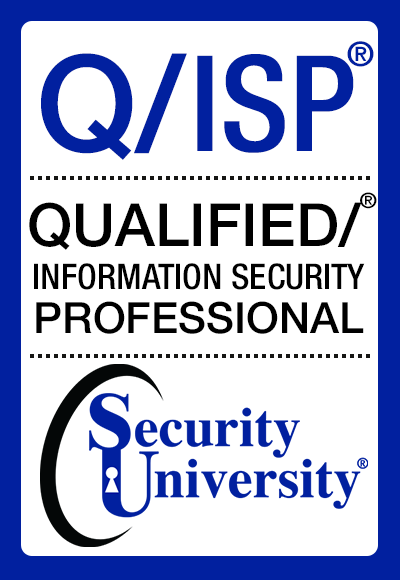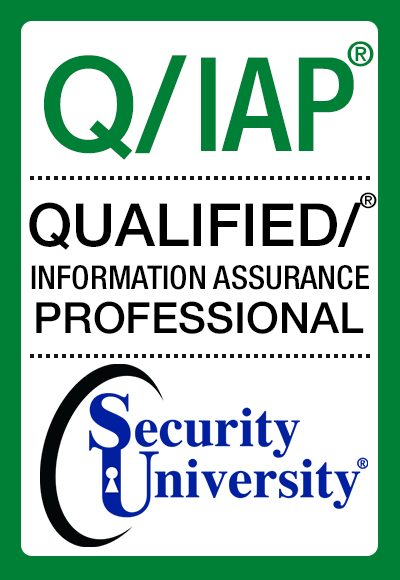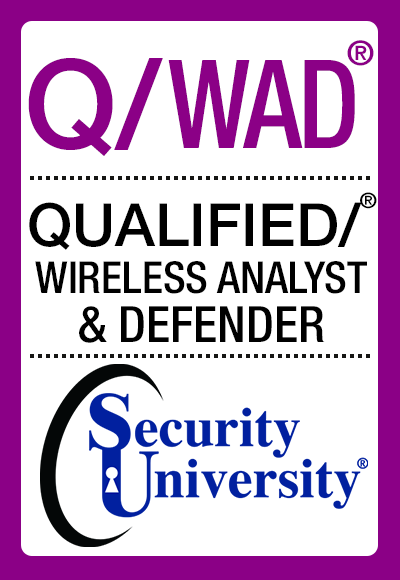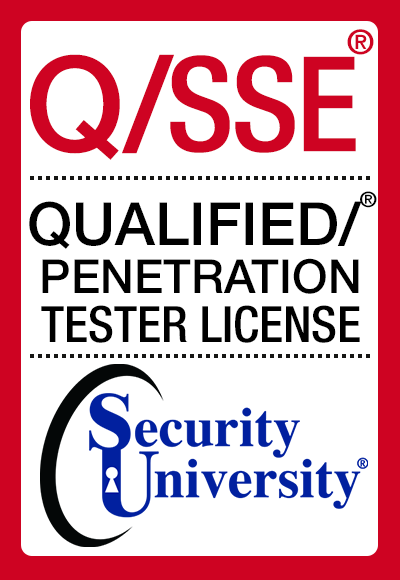Security University Q/ISP®
How can I tell if a security or assurance professional is really "Qualified" and not just yanking my chain?
Answer: Security University provides tactical security skills and knowledge to protect digital assets, websites, applications, systems and networks from unethical behavior, attacks, and inside threats as an individual or as a company. The best way to verify an Individuals qualification is by looking for the Qualified Professional Individual or Company logo on their Professional Status page. This page includes Security University 's validation and endorsement that the individual or company has received the Qualified status within the Security University Qualified Professional programs.
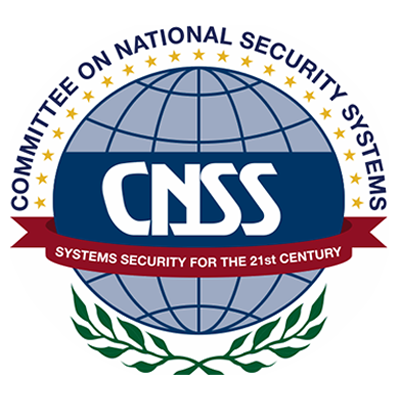 You can find the Professional Status page by clicking on the Security University 's Qualified Individual or Company logo that is visible from the individual's or company's endorsement logo located after their name and title. If you don't find it, simply ask your Qualified professional for the link to their Qualified Professional Status page. Once you find the page, ensure that the page and professional are authentic:
You can find the Professional Status page by clicking on the Security University 's Qualified Individual or Company logo that is visible from the individual's or company's endorsement logo located after their name and title. If you don't find it, simply ask your Qualified professional for the link to their Qualified Professional Status page. Once you find the page, ensure that the page and professional are authentic:
- The Qualified Professional's business name.
- Qualified Professional Status page hosted by Security University.
- Security University's validation of the individual or company's Qualified status.
Q/SA ® Q/PTL ® Class Training April 2010 Testimonial
As an Army Information Systems Management (FA53) officer focusing on Cyber Defense, I've had the opportunity to train and certify in several IA/CND specific programs as well as work a myriad of Army Cyber Defense workforce training and development issues.
Having just recently completed the Security University (SU) Qualified Security Analyst (Q|SA) and Qualified Penetration Tester License (Q|PTL) courses I can confidently say that Sondra and her team have built an exceptional program of instruction; capturing the essential elements of security analysis and penetration testing methodologies and delivering them in a clear and concise format in a blended learning environment of lecture and hands-on practical skill development with scenario-based final examinations. SU training techniques are a perfect match for our military cyber defense workforce goals since they not only train the relevant concepts of cyber defense and its CND specialties but also in the case of Q|SA and Q|PTL courses challenge the students to apply those concepts in a "tactical" setting that an actual security analyst or penetration tester might see.
Security University's Q|SA / Q|PTL program of instruction is impressive and superior to some other training programs in several ways; one of them being the daily hands-on assessment of critical skills being taught. Another was the realistic practical final exam which included a penetration test with a final report that required some in-depth analysis of the resulting sets of data. I spent 30 post-course hours alone on analyzing the data and developing a 32 page report. That's definitely an experience you're not going to get through other training programs that teach a five day curriculum that's predominately lecture based. The Q|SA and Q|PTL courses also expose the students to a wide range of open and closed source automated tools for use in security analysis and penetration testing as well as the built-in assessment and exploitation capabilities of both Linux and Windows based operating systems. I honestly can't understand how we expect to conduct defense in depth across the GiG without our technical workforce understanding basic exploitation, which is exactly what's missing from many other approved certifications. SU equally balances this with methodology and analysis techniques rather than relying on specific toolsets since tools frequently change and are always subject to interpretation of their results.
Many leaders and managers in a resource constrained environment try to meet FISMA compliance by targeting those one-shot, many-kills certifications that are on the DoD 8570.01M chart with little regard for how relevant the training might be for certain 8570 categories. No better example can be given than the inclusion of CISSP as an IAT validating certification. Being a CISSP I can attest that it's a great certification for a security manager as it is wide and deep in several essential bodies of knowledge. But it will not enable a security technician, especially at the enclave level, to secure enterprise environments from a hands-on technical approach nor understand the threat and environment essential to effective defense in depth. Therefore it adds little value for an organization to have an IAT-III CISSP from a technical standpoint, but practically, that person can also fill other roles since CISSP covers everything from IAT-I through IAM-III. Hence, managers focus on CISSP and miss excellent training like Security University's programs.
Security University training should be a major part of any organization's information security training programs.
SHANE F. LIPTAK,
Major, USA
Cyber Defense Officer, 21st Signal Brigade
CISSP, GCIH, Q|SA, Q|PTL, MCTS, Sec+, Net+

